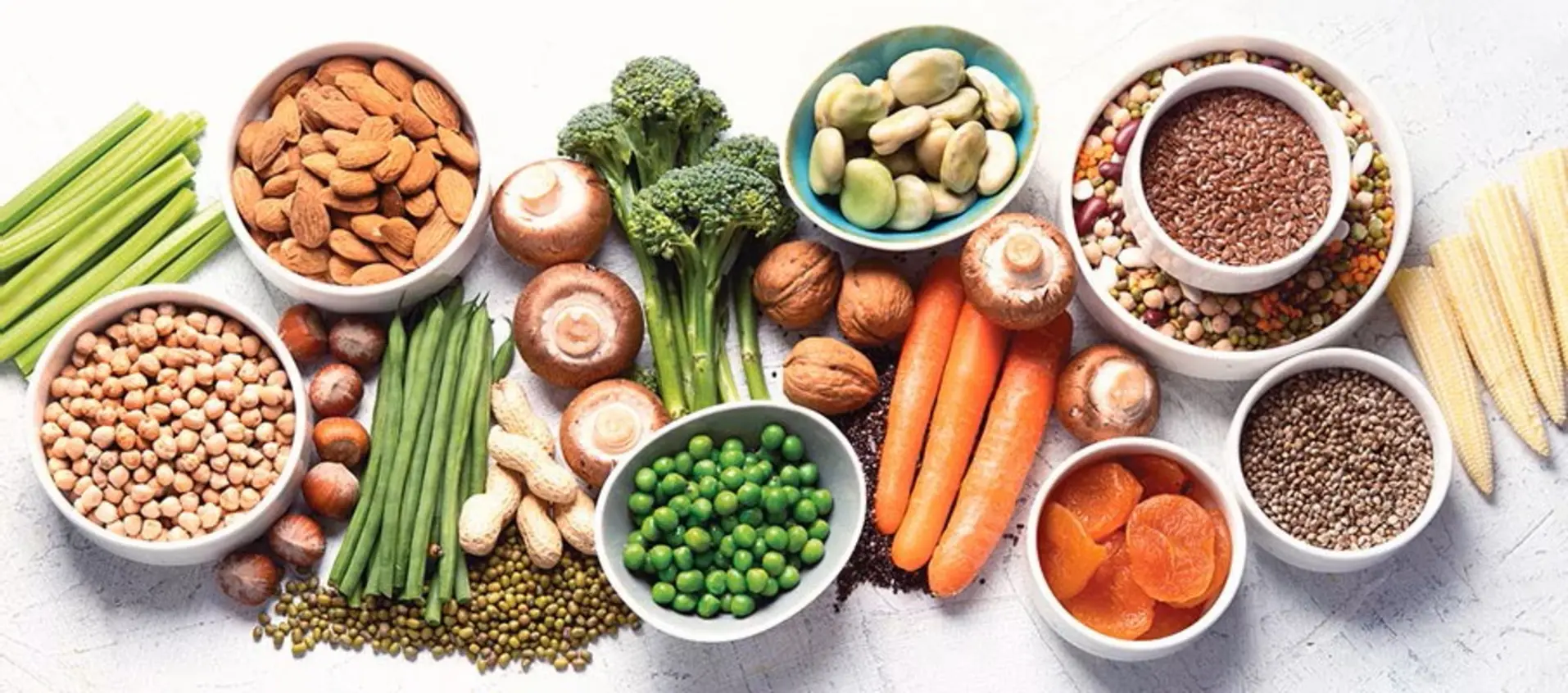Your glow starts in your gut. And many of today’s most common fiber deficiency symptoms are showing up first on your skin, energy levels, and digestion.

Your glow starts in your gut. And many of today’s most common fiber deficiency symptoms are showing up first on your skin, energy levels, and digestion.
September 30, 2025
In the age of aesthetic obsession, we chased idealized beauty - the perfect silhouette, flawless skin, a glow untouched by time. This pursuit can spiral into a cycle of surface-level fixes and fleeting diet trends. Amidst the buzzwords of detox trends and low-carb pledges, we're told to "cut fats", "ditch the sugar", or "count every gram of oil" as the golden keys to perfection.
Yet, while macronutrients dominate the conversation, we have quietly sidelined beauty's unsung hero: fiber. The reality is, according to the Dietary Guidelines for Americans 2020-2025, approximately 97% of men and 90% of women in the U.S. do not meet the daily recommended intake of fiber - 25-30 grams of fiber each day. This neglect is not just a gap but a silent health crisis, linked to numerous serious conditions.
Beyond protein hype and "good fats", fiber is the invisible architect of radiant skin, effortless digestion, and true wellness - proof that beauty begins where trends end.
Studies consistently show that a high fiber diet is associated with lower inflammation, better gut health, and visibly clearer skin. Unlike diva nutrients that demand attention (looking at you, collagen), fiber works quietly: it's the indigestible part of plants that scrubs your intestines, feeds good gut bacteria, and even traps excess calories like a backstage bouncer.

Yet here is the paradox: our modern diet, rich in processed and refined foods, has drastically reduced our fiber intake. For example, milling white rice removes most of its fiber; and an apple becomes juice, shedding the majority of its fibrous benefits.
And here is a fun fact: that wood ear mushroom in your hot and sour soup, are the fiber heavyweight champions per gram - which is why they stay miraculously crunchy even when cooked!

Imagine your digestive system as a high-performance engine and fiber is its premium fuel, coming in two game-changing formulations. Soluble fiber, found in oats, beans and berries, transforms into a gel-like substance when mixed with water. This gel slows down sugar absorption to prevent energy crashes, traps cholesterol particles, and feeds your gut's good bacteria with precision. On the other side, insoluble fiber - abundant in brown rice, kale and those indestructible wood ear mushrooms add necessary bulk to stool while gently stimulating intestinal walls, creating an efficient waste removal system. The best part? Foods like avocados and chia seeds contain both types, working synergistically to nourish your microbiome while ensuring comfortable, regular digestion.


Decades of research now confirm that Dr. Denis Burkitt first observed in the 1970s that fiber's impact extends far beyond digestion to prevent the "Western disease" he identified: diabetes, heart disease, and colon cancer. Modern science has verified his hypothesis through 50+ years of studies showing how soluble fiber breaks down to generate anti-inflammatory compounds powerful enough to reduce systemic inflammation by nearly half.
Soluble fiber breaks down into short-chain fatty acids (SCFAs) like butyrate, which reduce inflammation and strengthen the gut lining. Meanwhile, insoluble fiber performs essential detoxification by binding to environmental toxins and escorting them out of your body - a cleansing process Burkitt called 'nature's intestinal broom.' Perhaps most remarkably, we now know that the gut bacteria nourished by fiber produce a significant portion of your body's serotonin, helping to explain why high-fiber diets correlate with improved mood and lower anxiety levels. Take a 2024 review in RSC Publishing as an instance, individuals with a higher dietary fiber consumption had a 49% lower risk of depression compared to those with lower intake.
In the UK, the NHS recommends 30 grams of fiber per day. However, according to functional medicine expert Rose Ferguson, the ideal intake isn't just 25-30 grams - but 35 to 50 grams per day, especially when supporting gut health, hormone balance, and stable blood sugar. That might sound like a lot, but it's entirely achievable when you focus on real plants: legumes, veggies, seeds, and grains.
Yet the majority of us are groupies failing to meet the recommended daily intake of fiber. And when your body lacks this multitalented performer, it starts sending out distress flares - which brings us to those 7 unmistakable warning signs.

These fiber deficiency symptoms often develop quietly, but over time they affect digestion, metabolism, mood, and even skin clarity. Your body whispers before it screams and when it comes to fiber deficiency, the signs are more obvious than you think. From stubborn bloating to unexplained fatigue, these subtle red flags are not just discomforts; they are your system's SOS for dietary intervention.
We decode the 7 most telling symptoms that your fiber intake needs an urgent update:
Are your bathroom visits like a chore? Fewer than three bowel movements weekly? That is your body signaling fiber deficiency. Here's what's happening inside: Fiber works like a traffic controller in your gut - without an adequate amount, digestion becomes a gridlocked system where waste sits idle for too long. According to UCSF Health, a high-fiber diet softens and adds bulk to the stool, allowing it to pass quickly and easily.
But there is a skin-deep consequence too. Sluggish digestion lets toxins linger and recirculate, which can contribute to inflammatory skin conditions like acne and premature aging. Fiber is not just a broom for your intestines but your skin's silent detox partner.
Cannot make it two hours post-lunch without thinking about snacks? Your low-fiber meal is to blame. Fiber acts like a time-release capsule in your gut - it expands when absorbing water like chia seeds swelling 10x their size and slows stomach emptying. This dual action triggers fullness hormones while physically stretching your stomach walls, sending "stop eating" signals to your brain. A study on ResearchGate suggests that fiber intake is an important regulator of ghrelin, the body's primary hunger hormone.
That overwhelming urge to nap after lunch is not normal - it is your body screaming about fiber deficiency. When you eat refined carbs without fiber like white bread or instant noodles, your blood sugar spikes faster than a crypto bubble, then crashes violently.
Here is what they do not tell you: Fiber acts as nature's traffic cop for glucose. It creates a gel-like barrier in your gut, slowing digestion so sugar enters your bloodstream at a steady pace like an IV drip of energy rather than a firehose. This prevents both the spike that destroys collagen and the crash that triggers cortisol-fueled sugar.
But the real scandal? Your brain gets addicted to this cycle. And your "tiredness" might actually be early metabolic dysfunction. The crash forces cortisol release, creating fake "hunger" for more sugar - a vicious cycle that ages skin and expands waistlines.
That unexplained irriation or sudden mood dips? It might be your gut microbes staging a protest. Fiber is not just food but the peacekeeper between your intestines and brain. When fiber-deficient, harmful bacteria dominate, releasing inflammatory compounds that may contribute to anxiety and mood fluctuations. As mentioned earlier, a 2024 review found that a higher dietary fiber consumption was associated with a 49% reduction in the odds of depression.
But here's the real gut punch: Your "stress snack" cravings between meals may actually your microbiome's survival tactic. Those 3 p.m. Chocolate urges? It is harmful bacteria demanding their sugar fix after you's starved them of their preferred fiber.
Watching calories but still clinging to those last 5 pounds? Your diet might be missing fiber's stealthy weight-loss superpowers. A randomized controlled crossover trial summarized on Examine.com found that a high-fiber, minimally processed diet reduced calorie absorption by 6% compared to a Western-style diet - low in fiber and high in refined, ultra-processed foods like white bread, fried snacks, and fast food. It leads to approximately 116 calories excreted per day, despite matched calorie intake.
Here is the kicker: Fiber-rich meals physically stretch your stomach like a balloon filling with water, triggering satisfaction signals that low-calorie junk food can't fake.
When meals lack fiber, you are left in a cruel paradox and your gut misses its cue to produce fat-blocking short-chain fatty acids (SCFAs). Worse? You may absorb up to 5% more calories from the same foods. The proof? Journal of Nutrition research tracked identical twins for a year and those eating less fiber gained 11 extra pounds despite matching calorie intake.
Fiber actually reduces bloating long-term, not the cause if you do not know. Without adequate fiber, your intestines lose their natural "sweeping" motion, allowing food debris to stagnate. Like forgotten leftovers in a warm fridge, this waste ferments produce gas that inflates your belly like a overproofed sourdough loaf.
The paradox? While people often blame fiber-rich foods for temporary bloat, consistent fiber intake actually "trains your gut microbiome to process food more efficiently", which helps to reduce bloating over time, according to Guts UK.
The relationship between fiber and skin health is no longer theoretical. A fiber-deficient gut fuels inflammation that shows up directly on the face. That stubborn acne or persistently dull complexion? The answer might not be in your skin care routine, but in your gut.
A diet lacking in fiber can lead to chronic, low-grade inflammation that manifests directly on your skin. When your gut microbiome is starved of fiber, it produces fewer of the anti-inflammatory compounds that protect your body. This systemic inflammation can damage collagen, disrupt your skin's natural barrier, and trigger breakouts. By nourishing your gut with fiber, you’re not just improving digestion - you are calming inflammation at its source, paving the way for the clear, radiant skin that no topical product can truly replicate. The result? A complexion that looks ‘hungover’ even with perfect skincare.
Are you listening to your gut? Because most fiber deficiency symptoms do not appear overnight. They build slowly, quietly, until your body can no longer compensate. The solution is rarely another supplement or surface fix, but a return to dietary fiber as the foundation of health, digestion, and skin vitality.